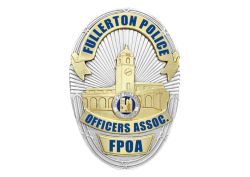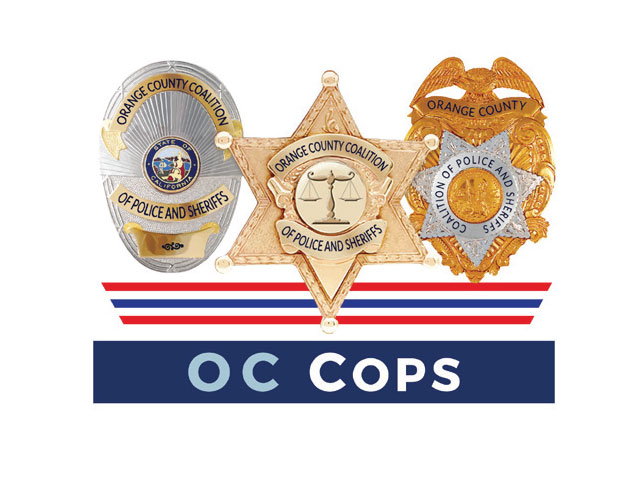
The FPOA evolved to what it is today thanks to our law enforcement brethren from back in the 1950’s. With World War II over and G.I.’s returning home to sunny California, calls for service increased all over including the City of Fullerton. Old school foot patrols were going to have to step aside to more patrol cars and two way radios. More officers were needed to handle the community’s growing needs. In 1951, the Department was increased to a total of 21 employees. By 1953, the men were earning $306 per month and working 48 hours a week. The chief of police at this time was Ernest Garner. During Chief Garner’s term as chief, wages were steadily increased, working hours were reduced to 40 hours per week, modern equipment was purchased, and the department continued to grow along with the city at a rapid rate.On February 2, 1955, the Fullerton News Tribune announced that the “Fullerton policemen formed their own organization, The Fullerton Police Benefit Association”. According to Officer Fred King, President, the association would provide a form of insurance, a loan agency and a sponsor for social activities. The organization was initially started for fraternal interests such as the annual New Year’s Eve party and summer picnic. It was patterned after other police benefit associations. The organization was to facilitate the handling of funds for police aid, charitable contributions and social functions. The dues were $1.00 per month and would provide $1000 insurance policy.
The FPBA assisted officers with insurance issues and initiated a fund from which members could borrow funds on a temporary basis. At this time officers were paid only once per month so it was easy to run short of cash just before payday. Small loans not to exceed $20 would be made from the funds by members without the need for paying interest. The organization would also make funds available to civic projects such as the Boys Club, St. Jude Hospital, aid for widows and orphans of members, donations for needy cases coming to the attention of the police department, and donations for such items as funeral flowers. The Tribune also said that the first Board of Directors were: Officer Fred King, Officer Louis Parker as vice-president, Matron Helen Valentino as secretary-treasurer, and Sgt. Charles Davis as sergeant at arms. They held breakfast meetings every three months. The FPBA was formally incorporated in 1962. The FPBA was starting to change in both members and duties. The department’s political atmosphere of the time was such that a strong and binding association was not practical. As time progressed there became a real need for employee representation for such issues as wages, benefits and working conditions. The officers themselves realized theses needs and made the decision to make their “group” stronger. They began by forming a wage negotiation representation team. They attended classes on their own time to gain the proper knowledge in dealings and negotiations of wage and benefit contracts.
In the late 1960’s, the president became the primary negotiator with the city. Prior to this the chief of police informally represented the officers and argued that he could not hire competent officers unless a certain level of salary was paid. For many years if any salary increase was given it was the same increase granted to the Fire Department even though the job load, job stress and risks were far different than any fireman would experience. In the early years of the association salary increases and benefits were not very dramatic and issues of equipment, officer safety and other benefit matters were not part of the negotiations. As times changed so did the FPBA. Issues became more complicated in representing the membership. No longer was the focus just on wage and benefit issues. The legal atmosphere of society had changed. Officers were held to a much higher standard than in prior times. Officers were more tightly scrutinized for their actions both on and off duty. The area of contract negotiations also became more and more complicated. This required far more expertise than in previous times. The Association stepped forward in retaining a law firm full time to assist in all aspects of their member’s needs and representations. A formal dues structure was set in place to meet the expenses of the increased representation. In 1971, with Phil Goehring as the President, the association went to “impasse” with the City over salary for the very first time. In the previous years, tensions had built over a promise made by the city council years before, “that the Fullerton police officer’s salary would be in the two- thirds quartile of the highest five paid cities in Orange County.” In the years prior officers were not truly represented in the wage and benefit bargaining process. The retirement then was with PERS, but within the system of 1% at 55 years of age. The new stronger association began to fight for its members.
The FPBA then became more or less a “union” with the introduction of the Peace Officer’s Bill of Rights; the state legislature now gave the POAs everywhere the right to represent their members when they were charged with job related offenses. Expansion of this type of representation quickly occurred. In 1977, the association continued to grow in size and strength. One story from the time is when the association took the chief to task on the issue of not having shotguns in the units. During this time the only units to have shotguns were the sergeant’s cars. A general membership meeting was called with the chief over the issue. One of the members who voiced his opinion in that meeting was told by the chief, “You were selling shoes when I hired you and you can sell them again for all I care.” With that said, the association knew exactly where the chief stood. However, the association continued to question other various issues. In 1979, the association fought for and won a 30% single year increase. The members not only walked the picket line in front of city hall but they also rallied the business community. The association from then on was no longer “just a social, partying bunch.” In 1983, with Rex Stricklin at the helm, the FPBA changed the name to the current, Fullerton Police Officers’ Association. Some of the accomplishments for this administration were negotiating the original 12 Master Patrol Officers to a total of 41 new additions and renaming all 53 as “Senior Officers”. The association purchased one of the original three Police Canines (Barney). The FPOA first started its Political Action Committee (PAC) in 1994. For many years the PAC was passive in its political activities. When election years rolled around, the PAC would interview candidates and give one or two of them an endorsement but little else. As the association entered the 21st century, it was felt that the association and its members should become more involved in the community to insure that it continues to be for the people living and working in Fullerton. The PAC and its members are committing more resources towards this effort each year. The goal is that in the future elections the best candidates get elected to keep Fullerton safe. In 2000, the FPOA-PAC endorsed two candidates for city council. A lengthy interview process was completed to determine who the best persons were for the positions available. The PAC came out and supported two candidates and took on a stronger role, by walking precincts, hanging signs and sending out mailers to the citizens of Fullerton. On November 7 2000, the two candidates finished 1—2 out of 8 candidates running for the three available seats. This was a great victory for the FPOA-PAC and the citizens.
The FPBA assisted officers with insurance issues and initiated a fund from which members could borrow funds on a temporary basis. At this time officers were paid only once per month so it was easy to run short of cash just before payday. Small loans not to exceed $20 would be made from the funds by members without the need for paying interest. The organization would also make funds available to civic projects such as the Boys Club, St. Jude Hospital, aid for widows and orphans of members, donations for needy cases coming to the attention of the police department, and donations for such items as funeral flowers. The Tribune also said that the first Board of Directors were: Officer Fred King, Officer Louis Parker as vice-president, Matron Helen Valentino as secretary-treasurer, and Sgt. Charles Davis as sergeant at arms. They held breakfast meetings every three months. The FPBA was formally incorporated in 1962. The FPBA was starting to change in both members and duties. The department’s political atmosphere of the time was such that a strong and binding association was not practical. As time progressed there became a real need for employee representation for such issues as wages, benefits and working conditions. The officers themselves realized theses needs and made the decision to make their “group” stronger. They began by forming a wage negotiation representation team. They attended classes on their own time to gain the proper knowledge in dealings and negotiations of wage and benefit contracts.
The FPOA is involved in the city more than ever. We provided donations to many different charities and organizations. We have provided money and volunteer work for the homeless such as the Coast to Coast Foundation and the Pathways for Hope. We contribute to many sport organizations such as the Boys and Girls Club, Fullerton Little League, Fullerton Pop Warner, Booster Clubs for many of the local schools in the area. We donate to the American Cancer Society, Ronald McDonald House and many others. We offer scholarships to Fullerton high school seniors who plan on attending college right after graduation. We are also proud members of the Fullerton Chamber of Commerce. We as an association will continue to work with the city administrators and the citizens of Fullerton to continue to provide a high level of service they expect from their police officers. We also will continue to work with the community as a partner in helping those in need and making this city a great place to live and visit.
Kevin Pedrosa
President
